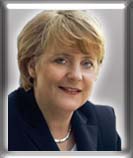Germany draws up new rules to control foreign state funds
 Berlin - German Chancellor Angela Merkel's ruling coalition unveiled Wednesday new far-reaching rules to head off powerful foreign-owned state-controlled funds going on a shopping spree for companies in Europe's biggest economy.
Berlin - German Chancellor Angela Merkel's ruling coalition unveiled Wednesday new far-reaching rules to head off powerful foreign-owned state-controlled funds going on a shopping spree for companies in Europe's biggest economy.
Of particular concern to Merkel's conservative Christian Democrat-led coalition is the threat posed to key German industries, such as telecoms, banks and energy sectors, by cash-rich state funds from Russia, the Middle East and China.
The proposals agreed to by Merkel's Cabinet will mean moves from non-European Union controlled investment groups or companies to buy a 25 per cent or more stake in strategic parts of German industry can in future be blocked.
Based on a US model, Germany's plans could help to boost the prospects of EU-wide rules aimed at possibly vetoing the incursions by foreign investors into sensitive industries.
But Berlin's drive to enhance government regulation of the push by investment funds operated by foreign governments into corporate Germany has set the alarm bells ringing in German business.
"Foreign investment brings many advantages such as economic growth, employment and as a result rising living standards," said the general secretary of Germany's International Chamber of Commerce (ICC), Angelika Pohlenz.
She said that the plan could lead to lower foreign investment in Germany and trigger limits on German investment in other parts of the world.
The ICC's concerns were echoed across German business with the chief of the nation's influential Federation of German Industry (BDI), Werner Schnappauf saying Berlin's new laws sent "the wrong signal for Germany as a place to invest."
"As the world's leading export nation and a key source of foreign investment, Germany is heavily dependent on open markets," said Schnappauf, adding that foreign investment underpinned more than 2 million jobs in Europe's biggest economy.
A report prepared by the investment house, Morgan Stanley estimated that the state funds could already control up to 2.5 trillion US dollars worldwide, building to 12 trillion US dollars by 2015.
Last year, the Chinese Government acquired a 10 per cent stake in the US private equity house Blackstone, which has a key holding in German-based Deutsche Telekom AG, which is Europe's biggest phone company.
This followed moves by Russian state bank VTB to carve an interest in Europe's sensitive aeronautic and defence sector by seeking out a stake in the European Aeronautic Defence and Space group (EADS), which is the parent company of the European aircraft maker Airbus.
At the same time, Berlin has spearheaded a push to ensure greater transparency of the international hedge-fund industry, despite the reluctance of both Britain and the US to take action to monitor the 1.4-trillion-dollar business.
But analysts said that the risk is that foreign state funds could use groups based in other parts of the EU to move in on key German corporations.
Under the Merkel government's plans investors would have to notify the government when purchasing more than 25 per cent of a major German company.
While other EU member states have also been mulling over ways to regulate foreign-controlled funds, the German plan is markedly different to Britain where London has welcomed the push by wealthy government-controlled funds to pickup companies in the UK and ruled out erecting barriers. (dpa)